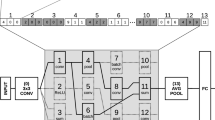Abstract
We focus on the evolutionary design of programs capable of capturing more randomness and outliers in the input data set than the standard genetic programming (GP)-based methods typically allow. We propose Genetic Programming with Associative Memory (GPAM) – a GP-based system for symbolic regression which can utilize a small associative memory to store various data points to better approximate the original data set. The method is evaluated on five standard benchmarks in which a certain number of data points is replaced by randomly generated values. In another case study, GPAM is used as an on-chip generator capable of approximating the weights for a convolutional neural network (CNN) to reduce the access to an external weight memory. Using Cartesian genetic programming (CGP), we evolved expression-memory pairs that can generate weights of a single CNN layer. If the associative memory contains 10% of the original weights, the weight generator evolved for a convolutional layer can approximate the original weights such that the CNN utilizing the generated weights shows less than a 1% drop in the classification accuracy on the MNIST data set.
Access this chapter
Tax calculation will be finalised at checkout
Purchases are for personal use only
Similar content being viewed by others
Notes
- 1.
Data sets are available at https://doi.org/10.5281/zenodo.7583555.
References
Capra, M., Bussolino, B., Marchisio, A., Shafique, M., Masera, G., Martina, M.: An updated survey of efficient hardware architectures for accelerating deep convolutional neural networks. Future Internet 12(7), 113 (2020)
Dupuis, E., Novo, D., O’Connor, I., Bosio, A.: A heuristic exploration of retraining-free weight-sharing for CNN compression. In: 27th Asia and South Pacific Design Automation Conference, ASP-DAC, pp. 134–139. IEEE (2022)
Goodfellow, I., Bengio, Y., Courville, A.: Deep Learning. MIT Press, Cambridge (2016)
Han, S., Mao, H., Dally, W.J.: Deep compression: compressing deep neural network with pruning, trained quantization and Huffman coding. In: 4th International Conference on Learning Representations, ICLR (2016)
Koza, J.R.: Genetic Programming: On the Programming of Computers by Means of Natural Selection. MIT Press, Cambridge (1992)
La Cava, W., et al.: Contemporary symbolic regression methods and their relative performance. In: Vanschoren, J., Yeung, S. (eds.) Proceedings of the Neural Information Processing Systems Track on Datasets and Benchmarks. vol. 1 (2021)
La Cava, W.G., Helmuth, T., Spector, L., Moore, J.H.: A probabilistic and multi-objective analysis of lexicase selection and \(\epsilon \)-lexicase selection. Evol. Comput. 27(3), 377–402 (2019)
Langdon, W.B.: Genetic Programming and Data Structures: Genetic Programming \(+\) Data Structures = Automatic Programming! Springer, Cham (1998)
LeCun, Y., Cortes, C., Burges, C.: MNIST handwritten digit database. ATT Labs. https://yann.lecun.com/exdb/mnist (2010)
McDermott, J., et al.: Genetic programming needs better benchmarks. In: Proceedings of the 14th International Conference on Genetic and Evolutionary Computation, pp. 791–798. ACM (2012)
Miller, J.F.: Cartesian Genetic Programming. Springer, Berlin (2011)
Schmidt, M.D., Lipson, H.: Coevolution of fitness predictors. IEEE Trans. Evol. Comput. 12(6), 736–749 (2008)
Stanley, K.O.: Compositional pattern producing networks: a novel abstraction of development. Genet. Program Evolvable Mach. 8(2), 131–162 (2007)
Stanley, K.O., D’Ambrosio, D.B., Gauci, J.: A hypercube-based encoding for evolving large-scale neural networks. Artif. Life 15(2), 185–212 (2009)
Sze, V., Chen, Y., Yang, T., Emer, J.S.: Efficient processing of deep neural networks. Synth. Lect. Comput. Archit. 15(2), 1–341 (2020)
Teller, A.: The evolution of mental models. In: Kinnear, K.E., Jr. (ed.) Advances in Genetic Programming, pp. 199–219. MIT Press, Cambridge (1994)
Vanneschi, L., Castelli, M., Silva, S.: A survey of semantic methods in genetic programming. Genet. Program Evolvable Mach. 15(2), 195–214 (2014). https://doi.org/10.1007/s10710-013-9210-0
Villegas-Cortez, J., Olague, G., Aviles, C., Sossa, H., Ferreyra, A.: Automatic synthesis of associative memories through genetic programming: a first co-evolutionary approach. In: Di Chio, C., et al. (eds.) EvoApplications 2010. LNCS, vol. 6024, pp. 344–351. Springer, Heidelberg (2010). https://doi.org/10.1007/978-3-642-12239-2_36
Acknowledgements
This work was supported by the Czech science foundation project 21-13001S, and it was partly carried out under the COST Action CA19135 (CERCIRAS).
Author information
Authors and Affiliations
Corresponding author
Editor information
Editors and Affiliations
Rights and permissions
Copyright information
© 2023 The Author(s), under exclusive license to Springer Nature Switzerland AG
About this paper
Cite this paper
Juza, T., Sekanina, L. (2023). GPAM: Genetic Programming with Associative Memory. In: Pappa, G., Giacobini, M., Vasicek, Z. (eds) Genetic Programming. EuroGP 2023. Lecture Notes in Computer Science, vol 13986. Springer, Cham. https://doi.org/10.1007/978-3-031-29573-7_5
Download citation
DOI: https://doi.org/10.1007/978-3-031-29573-7_5
Published:
Publisher Name: Springer, Cham
Print ISBN: 978-3-031-29572-0
Online ISBN: 978-3-031-29573-7
eBook Packages: Computer ScienceComputer Science (R0)



